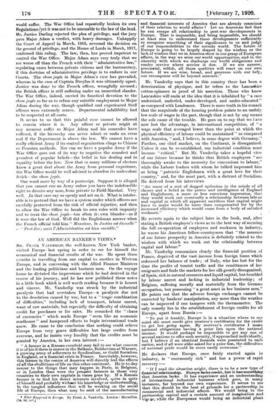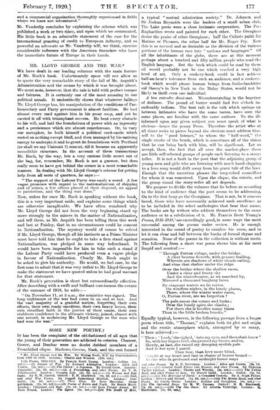AN AMERICAN BANKER'S VIEWS.* lila. FRANK VANDERLIP, the well-known New
York banker, visited Europe last spring in order to see for himself the
economical and financial results of the war. He spent three aaonths in travelling from one capital to another in Western Europe, and in conversing with the Allied Finance Ministers and the leading politicians and business men. On the voyage home he dictated the impressions which he had derived in the course of his journey, and he has now published these notes in a little book which is well worth reading because it is honest and sincere. Mr. Vanderlip was struck by the industrial paralysis that had overtaken Europe—a paralysis due not to the desolation caused by war, but to a " tragic combination of difficulties," including lack of transport, labour unrest, want of raw materials, but especially the difficulty of obtaining credit for purchases or for sales. He remarked the " chaos of currencies " which made Europe " seem like an economic madhouse " and hampered efforts to begin international trade
anew. He came to the conclusion that nothing could relieve Europe from very grave difficulties but large credits from overseas, and he insists very forcibly that the credits must be granted by America, in her own interest :- " A farmer in a Kansas cornfield may fail to see what concern it is of his if there is unrest in the Balkans, Bolshevism at Warsaw, a growing army of adherents to Syndicalism, or Guild Socialism in England, or a financial crisis in France. Inevitably, however, this farmer in the centre of America will directly feel the effects of all the ebullitions of life on this other continent. He is to-day nearer to the things that may happen in Paris, in Belgium, or in London than were the peasant farmers in those very countries to their own capitals in times gone by. If a Kansas farmer is to find his direct interests involved, quite in spite of himself and probably without his knowledge or understanding, in the tangled influences that will be working on the social life of Europe, then what may be said of the manufacturing • What Happened to Europe. By Frank .4. tanderllp. London : Macmillan. (5a ed. uct.j and financial interests of America that are already conscious of their relation to world affairs ? Let no American feel that he can escape all relationship to post-war developments in Europe. That is impossible, and being impossible, we should at least aim to understand those developments sufficiently to recognize something of their significance to us and judge of our responsibilities to the outside world. The futuro of Europe is going to be largely shaped by the wisdom or the lack of wisdom that we in America show in our grasp of European affairs, in the way we seize our world opportunities, and in tho sincerity with which we discharge our world obligations and render service where service is due. If we are narrow, provincial, selfish, all those qualities will react on our own future. If we are wise, broad, and generous with our heir, our recompense will be beyond measure."
Mr. Vanderlip says that in this country there has been a deterioration of physique, and he refers to the Lancashire
cotton-spinners in proof of his assertion. Those who know Lancashire will smile at the idea that it is inhabited by " a race undersized, underfed, under-developed, and under-educated" as compared with Londoners. There is more truth in his remark that the magnitude of the housing problem points to an unduly low scale of wages in the past, though that is not by any means the sole cause of the trouble. He goes on to say that we have now lost the advantage, in international competition, of " a wage scale that averaged lower than the point at which the physical efficiency of labour could be maintained " as compared with America, " and, I believe, in some degree with Germany."
Further, our chief market, on the Continent, is disorganized. Unless it can be re-established, our industrial condition must become " critical." But Mr. Vanderlip takes a hopeful view of our future because he thinks that British employers " are thoroughly awake to the necessity for concessions to labour," while the Labour leaders with whom he talked impressed him as being " patriotic Englishmen with a great love for their country," and, for the most part, with a distrust of Socialism.
He derived from his interviews
" the sense of a sort of dogged optimism in the minds of all classes and a belief in the power and intelligence of England and Englishmen, a more or less conscious impression, that they would work out eventually a relationship between labcur and capital in which all apparent sacrifices that capital might have to make would be more than compensated for by the increased efficiency which would come from a body of satisfied workmen." •
He reverts again to the subject later in the book, and, after stating a British employer's views as to the best way of securing the full co-operation of employers and workmen in industry,
he warns his American fellow-countrymen that " the measure of our future prosperity in America is definitely related to the wisdom with which we work out the relationship between capital and labour."
Mr. Vanderlip summarizes clearly the financial position of France, deprived of the vast income from foreign loans which redressed her balance of trade ; of Italy, who has lost for the
time the profits of tourist traffic and the remittances of her emigrants and finds the markets for her silk greatly disorganized; of Spain, rich in natural resources and liquid capital, but troubled
by labour unrest and lacking in industrial leadership ; of Belgium, suffering morally and materially from the German occupation, but possessing " a great asset in her business men." He points out that the adverse foreign exchanges cannot be corrected by bankers' manipulation, any more than the weather can be improved if one tampers with the thermometer. The only remedy lies in the establishment of foreign credits for all Europe, apart from Russia :-
" To put it frankly, Europe is in a situation where to my mind she must needs give receiver's certificates for the credit to get her going again. By receiver's certificates I mean national obligations having a prior lien upon the national income. It would perhaps be impossible to get any one of several nations to offer such security, if approached individually, but I believe if an identical formula were presented to each nation, and if all were alike asked for a prior lien, the difficulties of national pride would be more easily overcome."
He declares that Europe, once fairly started again in industry, is " enormously rich " and has a power of rapid recovery :—
" If I read the situation aright, there is to be a new type of financial relationship. Europe lacks credit, but it has something that America lacks. • It has experience and an understanding of international industrial business which goes, in many instances, far beyond our own experience. It seems to me that this should be the best of grounds for a partnership in commercial and industrial affairs. We would bring to the partnership capital and a certain amount of imagination and vigcur, while the Europeans would bring an industrial plant
and a commercial organization -thoroughly experienced in fields where we have not adventured."
Mr. Vanclerlip concludes by explaining the scheme which was published a week or two since, and upon which we commented.
His little book is an admirable statement of the case for the international granting of credit to European industry, and so powerful an advocate -as Mr. Vanderlip will, we think, exercise considerable influence 'with the American financiers who have the immediate future of Europe in their hands.







































 Previous page
Previous page